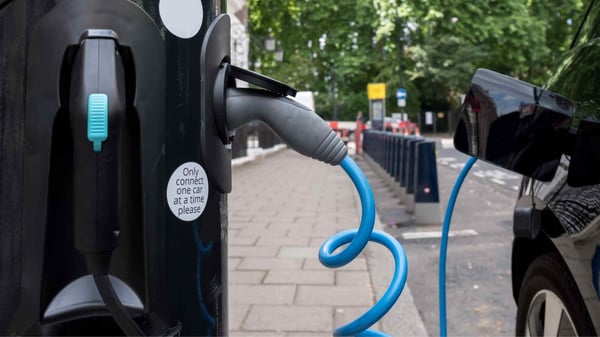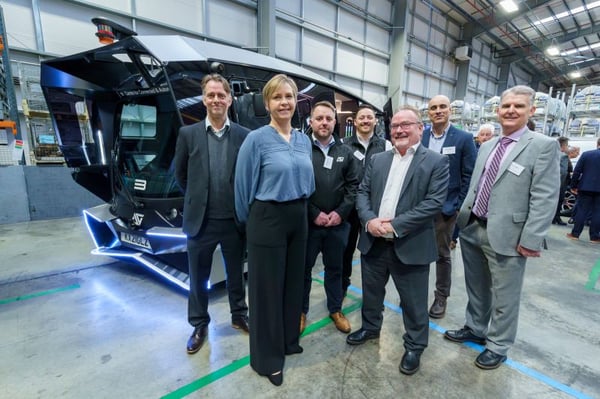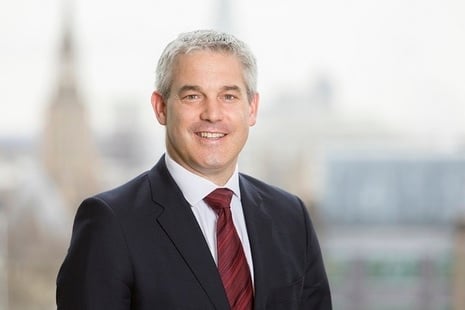OS: Mapping the way to a clean energy and carbon free future
Ordnance Survey (OS) has been working on innovations around sustainability, aligning with partners on projects designed to counter climate change challenges. We continue to provide enhancements to our data that support net zero and biodiversity targets. Closer to home, we have been focused on reducing our own carbon footprint and on mapping our way to reaching net zero.
 The most significant initiative in our roadmap to net zero has been the construction of our Head Office in Southampton, more than a decade ago. Originally a quarry and then a natural spoils landfill site, the office was purpose-built as a modern and sustainable building and continued sustainability initiatives have significantly contributed toward a nearly 80% reduction in Scope 1 and 2 emissions over a five-year period.
The most significant initiative in our roadmap to net zero has been the construction of our Head Office in Southampton, more than a decade ago. Originally a quarry and then a natural spoils landfill site, the office was purpose-built as a modern and sustainable building and continued sustainability initiatives have significantly contributed toward a nearly 80% reduction in Scope 1 and 2 emissions over a five-year period.
The design of the building helped us achieve the globally approved BREEAM Excellent certification in 2010 and we refocused on sustainability in following years to achieve ISO 14001 – the internationally agreed standard for the improvement of effective environmental management practices. Six successful audits later, we have continued to uphold that standard and keep our focus on sustainability by resolutely holding onto the core principle of continual improvement.
Clean energy at Explorer House
Cutting edge when the site was designed 12 years ago, OS uses ground source heat pumps which either heat or cool the building through the seasons. The tank sitting below the surface of the soil can collect up to 80,000 litres of runoff rainwater which is used to flush the toilets, and when there is extra supply, it can be used to irrigate the grounds and helps us to reduce water demand in the local area.
On the roof of Explorer House, 400 solar PV panels provide electricity directly to our building, generating more than enough to power our 34 onsite Electric Vehicle chargers. The panels were installed in 2022 in a push to decarbonise the site. We still rely on energy from the grid, so to make sure we’re sourcing from the right places, we’ve transitioned to REGO backed 100% renewable electricity and RGGO backed green gas tariffs.
We have been replacing our hand dryers with more efficient models. One of the largest energy efficiency projects we’ve run in recent years has been a three-phase transition to 100% LED lighting on-site. As a three-storey building, Explorer House has more than 4,300 light bulbs which have now been 100% LED since January 2023, controlled by smart controllers respond to motion and also natural light levels to avoid unnecessary energy use.
As far as facilities go, our catering is also with a provider that values sustainability. Daily catering needs are assessed by the footfall into the building, so food is not wasted, with the aim of sourcing produce from within 25 miles where possible. We also provide recycling facilities for cups and food and our waste contractor has a zero waste to landfill policy. All plastic bottles have been removed from our catering provision at Explorer House as part of the Greening Government Commitment (GGC) target for single-use-plastic-free estates.
Sustainable supply chain
As a business, we are also committed to understanding our supply chain emissions. Sustainability questions are now incorporated as standard within our tendering and due diligence processes. We are working to embed sustainability considerations within our standard documentation, so for example, we have a new climate clause in our supplier code of conduct. We are a CDP member, working with our key suppliers to better understand their emissions and where they are on their sustainability journey so that we can tackle our supply chain scope 3 emissions.
Transport
Sustainability is a major driver in the transport sector and with road transport accounting for more than 20% of total UK CO2 emissions, the transition to sustainable transport is crucial. In just three years, we’ve expanded from a few electric vehicles to a fleet of 115 fully electric and nearly 150 plug-in hybrid cars. Our aspiration is to hit 100% electric by the end of 2027. OS now has 34 electric chargers at Explorer House to support both the fleet of pool cars but also office-based employees as they go electric. By July 2024, use of the chargers has already avoided producing more than 180 tonnes of greenhouse gases – the equivalent of planting more than 4,600 trees and letting them grow for ten years.
OS takes pride in its active travel campaign, with room for more than 200 bikes, on-site showers, changing rooms and drying rooms. We also operate a cycle-to-work scheme, have a motivated and supportive cycle network, as well as offering a monthly bike doctor who's on hand to keep bikes on the road. Car sharing is encouraged too with priority spaces reserved for car sharers closest to the building. We are also trialling a suspension in the use of domestic business use flights with only minimal exceptions to mitigate our business travel emissions.
Biodiversity and Engagement at Explorer House
 Under the Greening Government Commitments we support the target of nature recovery. We have worked with local ecology experts to conduct ecology surveys, which informed the creation of a Biodiversity Strategy in 2023. In the last few years, we've turned over manicured lawns to wildflower meadows to become a haven for insects and wildlife, and have been supporting No Mow May and Let it Bloom June annually on remaining grass areas.
Under the Greening Government Commitments we support the target of nature recovery. We have worked with local ecology experts to conduct ecology surveys, which informed the creation of a Biodiversity Strategy in 2023. In the last few years, we've turned over manicured lawns to wildflower meadows to become a haven for insects and wildlife, and have been supporting No Mow May and Let it Bloom June annually on remaining grass areas.
 We have enthusiastic and knowledgeable employees who volunteer to help bring our Biodiversity Strategy to life. They have supported us with the installation of bat boxes, swift bricks, reptile mats, bee holes and bug hotels, as well as camera traps to see what animals we have visiting our site. So far, we have evidence of foxes, badgers and even deer. We keep a rough meadow, which acts as a wildlife buffer between us and the woods beyond, and keep a path mown so employees can enjoy the space without trampling and disturbing the meadow.
We have enthusiastic and knowledgeable employees who volunteer to help bring our Biodiversity Strategy to life. They have supported us with the installation of bat boxes, swift bricks, reptile mats, bee holes and bug hotels, as well as camera traps to see what animals we have visiting our site. So far, we have evidence of foxes, badgers and even deer. We keep a rough meadow, which acts as a wildlife buffer between us and the woods beyond, and keep a path mown so employees can enjoy the space without trampling and disturbing the meadow.
This spring we dug a brand-new wildlife pond at the north-eastern corner of the site, a key deliverable of our Biodiversity Strategy. This is already supporting a whole new ecosystem of wildlife including dragonflies and damselflies. In 2023 we turned six of our formal flower beds over to allotments, tended by OS employees, which benefit directly from our saved water, allowing herbs and vegetables to be grown for the kitchen.
We are very proud of the progress made so far at OS – but we know there is more to be done and will continue our commitment to working hard on our sustainability goals.
For more on our sustainability policies, please visit: Environmental and sustainability policy | Policies | OS (ordnancesurvey.co.uk).





